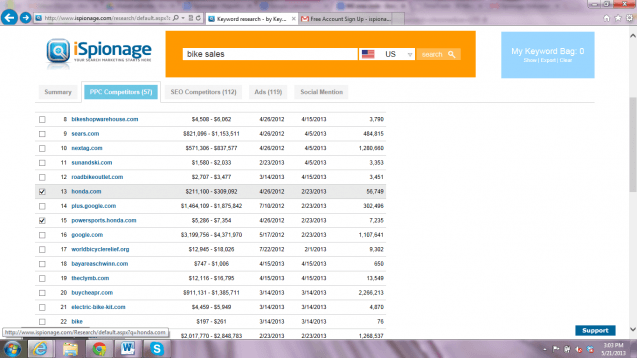
Who are the people in your neighborhood? In your neigh-bor-hoood! And no, we aren’t talking about the little blue garbage man or the crazy cat lady down the street. We’re talking about your Pay-Per-Click (PPC) neighbors. These are the companies that are competing with your business for the same search terms. If you end up in the wrong neighborhood, you may be overpaying for your PPC efforts – and missing out on potential business opportunities.
Why Your PPC Neighborhood Matters
A little competition is always healthy, but too much competition with the wrong companies could be costing your business some serious advertising cash. If your pet store sells cat supplies, not stationary and t-shirts – why is it competing with Hello Kitty for PPC ads? The same goes for your online bicycle store. Your shop has never sold motorcycles, but as you can see in the iSpionage search marketing competitive intelligence data below, Honda and motorsports companies come up in search results for the term “bike sales”.

It’s bad enough that your ads are being shown to unqualified customers. Even worse is the potential of paying a premium for top ad positions – even when your ads are completely irrelevant to these “customers”.
Bad PPC Neighbors Hurt Your Google Quality Score
Imagine that Tony Soprano moved in across the street – that would be bad news for home prices in your neighborhood! Just like the wrong neighbors can bring down your home’s value, so too can the wrong PPC neighbors bring down your Google Quality Score. PPC campaigns work by driving web traffic to your website in order to increase company visibility and boost sales. Before a potential customer even gets the chance to click on your ad, however, Google is working behind the scenes, deciding whether your ad will beat out the competition and be shown. Google makes this determination uses its “Quality Score” formula.
The Quality Score formula measures the relevancy of a company’s ad copy, keywords and landing pages – serving both as a predictor for a company’s online success and as a yardstick for determining ad display eligibility and minimum bid price. The higher your business’s quality score, then the less your business pays per click and the greater your business’s ROI. Conversely, low quality scores equate with lost leads and more expensive ads. So what does this mean for your business? If you’re competing with the wrong companies, you’re not only wasting money, but also missing out on real business opportunities.
Reduce Irrelevant Impressions: Build Your Negative Keyword List
A broad match keyword can bring up your ad in search engines even though the user’s query is not a real match for your company or product. The best way to avoid this – and narrow down your PPC neighborhood competition – is by creating a negative keyword list.
Negative keywords, also known as excluded keywords, help companies avoid unqualified web traffic and minimize irrelevant competition. So how do you know which keywords to add to your exclusion list? Get started with Google’s Negative Match tool. This tool helps businesses reduce and eliminate as many irrelevant impressions as possible. Negative keyword research is just as important as targeted keyword research.
- Get started with Google’s keyword tool: Enter a few keywords that you plan on targeting. Then, check the keyword column for search queries that are irrelevant/negative to your business. For example, if you enter “insurance” but only sell car insurance, you may need to add “homeowners” and “medical” to your negative term list.
- Run regular Search Query Reports (SQRs): While SQRs may be a tad old school, the information contained in them is still critical to negative keyword searches. Find your SQR in AdWords under the “keyword details” menu in the keyword report. Which terms trigger your ads to display? If your Rolling Stone concert tickets ad is displayed next to a geology textbook query, it’s time to get specific about which rocks are going to roll.
- Use negative words to funnel users to the right place. Negative terms are not always a bad thing; in fact, they can be useful for directing users to the right part of your website. For example, if you have specific campaigns for specific products or services, be sure to add your negative terms to the “Ad Group” level rather than the “Campaign” level. Broad terms (e.g., Hello Kitty) should be added to your pet store’s PPC “Campaign” level. Creating negative keyword lists can be an efficient way of shuffling these terms into the appropriate area within AdWords.
More specific terms, such as “dog food” or “Purina pet chow” could be added to different campaigns. While these terms may still be relevant to your overall store, you don’t want to be competing with dog food companies if your ad is targeting cat owners with a special cat food sale.
- Use a search marketing competitive intelligence tools. Today’s progressive search marketers and agencies turn to specialized search marketing competitive intelligence providers to help them stay on top of their competitive space. These tools allow you to explore the keywords your competitors are buying and avoiding, how much they are spending, and even set up competitor alerts to monitor tactical changes and shifts in your market.
Building a negative keyword list may seem like a bit of work, especially after creating your regular keyword list. However, the extra work you put in now will payoff in the long run. And if you need a little pick-me-up while you tune up the negative keywords in your AdWords account, feel free to hum along to this classic earworm.
Summary
It is important to understand which competitors and which terms are surrounding you if you want to be able to compete effectively in paid search advertising markets. Using keyword tools can help you develop this understanding, and using negative keywords and negative keyword lists can help ensure that you attract the attention of the most appropriate traffic. Fewer irrelevant impressions will increase your click-thru rate, which will boost your quality score and helps you beat out the neighborhood competition.
image credit: ShutterStock




